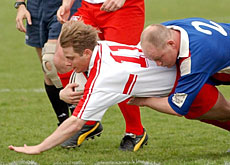Swiss rugby struggles to stay in touch

Efforts to raise the profile and standing of rugby in Switzerland are foundering due to a lack of commitment and funding, says the Swiss Rugby Union.
The sport’s national body claims no new talent is coming through the ranks and warns that the future of the game looks bleak.
Switzerland currently rank a lowly 39th in world rugby, sandwiched between Moldova (38) and Ivory Coast (40).
In the world cup qualifiers last year the national team lost 17-8 to Malta, a result that barely registered a mention in the country’s media.
“Switzerland does not care about rugby,” admits Li Marchetti, secretary of the Swiss Rugby Union and president of the Bern Rugby Club.
There are 20 clubs in Switzerland fielding around 27 teams, which is not a large number in international terms. In England alone there are over 1,000 teams.
There are 800 to 1,000 senior registered players in Switzerland, competing in three national leagues, each with six teams.
There are also several rugby schools with 400 to 600 children aged ten to 16, both male and female.
But efforts to develop the game are not making progress and very few new teams are being registered, if at all.
“We haven’t had any increase in the numbers of players for the past 15 years,” says Marchetti, who adds that little is being done to remedy the situation.
Commitment
The main problem, according to Marchetti, is that the Swiss lack commitment to what is still viewed primarily as an expats game.
“There are 20 clubs, for example, but I know of only three or four presidents who are Swiss. All the rest are foreigners – I’m French/Corsican,” he says.
Roger Zubler, president of Zug Rugby Club agrees, saying Swiss players often fail to turn up for training, unlike expats.
“The Swiss players still lack a lot of technical ability, and if you were really committed to rugby, you would want to know as much about it as you possibly could. Therefore you would always come to training.”
And the lack of enthusiasm is not confined to senior players. Marchetti, who is involved in running a rugby school for juniors, complains that the pool of young talent is a shallow one.
He says 50 per cent of parents won’t let their children play the game, because “they don’t like their children to get dirty”.
Funding
Then there is the issue of financial support.
“A team in the French fourth or fifth division has a budget of about €200,000 (SFr310,000),” says Marchetti.
“This is the entire budget of the Swiss Rugby Union, and this is only because we have a president who pays one-third of it out of his own pocket, because he really loves the game. We don’t have the money to do anything.”
Marchetti adds that there is some support from the International Rugby Board (IRB), but says it is not a large amount.
“We get £30,000 from the IRB, but we can only spend it on development and coaches for the national team.”
But Marchetti says he is grateful for the cash, pointing out that Swiss rugby gets practically no financial support from the Federal Sports Office or the Swiss Olympic Association.
Red card
The sport also faces a shortage of qualified referees, which critics say adds to the “amateur” nature of the sport in Switzerland and makes organising matches difficult.
One league play-off game at the end of last year was refereed by the vice-president of the winning team – a result that still rankles in some circles.
“There are not enough referees. What else can you do?” says Marchetti. “Last year we had to suspend a referee for one year for hitting a player.”
The secretary of the Swiss Rugby Union says he cannot see the situation improving until there is a change of attitude, but Roger Zubler at Zug Rugby Club insists things are getting better.
He may be right. In the past, Switzerland’s world ranking was even lower.
swissinfo, Chris Wilkins
There are 20 clubs in Switzerland, fielding around 27 teams.
There are 800 to 1,000 senior registered players.
They compete in three national leagues, each with six teams.

In compliance with the JTI standards
More: SWI swissinfo.ch certified by the Journalism Trust Initiative
You can find an overview of ongoing debates with our journalists here . Please join us!
If you want to start a conversation about a topic raised in this article or want to report factual errors, email us at english@swissinfo.ch.